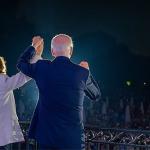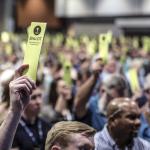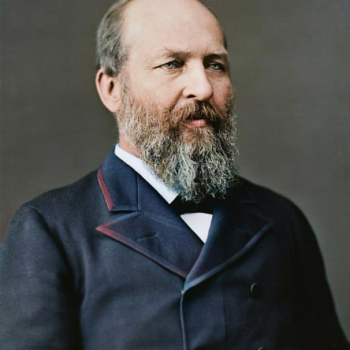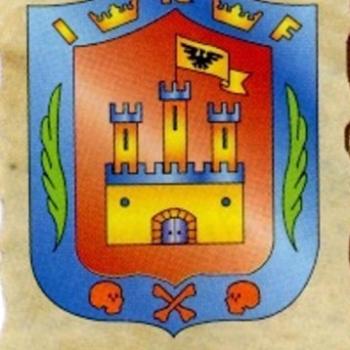This blog post is reposted from Current:
Now that he is the Republican vice presidential nominee, J. D. Vance is one of the most famous Catholic converts in the United States.

He is now the tenth Catholic to win a place on a presidential ticket. But of these ten Catholic nominees, Vance is the only Catholic convert – the only one who did not grow up in the faith.
As soon as his selection was announced, I read over his conversion narrative in hopes that it would give me some clues to his real beliefs. Like a few other cynics, I had been skeptical about Vance’s genuineness. His sudden conversion from a Never-Trumper who compared the Donald to Adolf Hitler in 2016 to an effusive supporter of President Trump when he needed his endorsement for his Senate campaign in 2022 seemed like such a cynically opportune move that Trump himself publicly commented on it. “J. D. is kissing my ass he wants my support so bad,” Trump declared at a rally for Vance two years ago.
So, with a bit of skepticism – but also with a genuine desire to understand Vance’s mindset – I turned to his autobiographical conversion narrative, which he published in the conservative Catholic magazine The Lamp in 2020, a year after he became a Catholic. I was surprised by what I found. The essay demonstrated that Vance was remarkably well read, and he had evidently given theology a great deal more thought than I had expected. At first, that made his desire to identify with Trumpism all the more puzzling to me, since some aspects of populist conservatism seemed at odds with the Catholic devotion he expressed in 2020. But I decided to read on and attempt to make sense of the seeming contradictions without writing Vance off as a hypocrite too hastily. I found much more consistency in his thought than I had initially expected, and I think that I came to a better understanding of his mindset – even if he’s not the exact type of Catholic convert that I might have wished him to be.
Vance grew up as a working-class cultural evangelical. As anyone who has lived in the South or the small-town Midwest knows, there are millions of people who profess a belief in Jesus but who don’t necessarily let Sunday morning get in the way of Saturday night. Vance’s family members, who migrated back and forth between eastern Kentucky and southwestern Ohio, were some of those people. Because his mother was a drug addict, he spent much of his childhood with his non-churchgoing evangelical grandmother – his “Mamaw,” as he called her.
“Mamaw was in so many ways a woman of contradictions,” Vance told the audience at the Republican national convention last week. “She loved the Lord, ladies and gentlemen. She was a woman of very deep Christian faith. But she also loved the F word. I’m not kidding. She could make a sailor blush.” She was a woman who stashed nineteen handguns around her house so that she could protect her family. “That’s who we fight for,” Vance said. “That’s American spirit.”
At first, Vance was more influenced by his grandmother’s fighting spirit than by her faith. Perhaps that was not surprising, since she almost never attended church herself and, according to Vance, hated “organized religion.” Vance said that as a teenager, he began searching for some religious anchor and occasionally attended church – usually of the Pentecostal variety – but never really committed.
Instead, he found an outlet in secular success of the type that was available to a young man from a working-class background in small-town Ohio. He joined the Marines, identified as a political conservative, and defended his love of football and the Republican Party while in law school at Yale.
But whatever faith he had had fell by the wayside. As he served his country in the Marines, he transitioned from a “devout” to a “nominal” Christian, he said, and then he gave up his faith altogether when he entered college in 2007. Because his faith before then had been heavily influenced by the charismatic prosperity gospel, it was easy to become doubtful when disaster struck – or when comrades in arms were killed. “The religious leaders I turned to tended to argue that if you prayed hard enough and believed hard enough, God would reward your faith with earthly riches,” Vance wrote. “But I knew many people who believed and prayed a lot without any riches to show for it.” If prayers weren’t answered, God must not exist, Vance decided. “I read Christopher Hitchens and Sam Harris, and called myself an atheist,” he recalled. He relished intellectual debates about religion, confident that he could defeat any Christian apologist with superior intellectual arguments.
During this time of unbelief, Vance’s “religion” consisted of the hard work necessary to lift himself out of the impoverished surroundings he was in. His bestselling memoir Hillbilly Elegy suggested that his community members’ apathetic attitudes were to blame for their failure to advance. Vance was not going to be apathetic. He earned his law degree (even though he decided by the end that he didn’t really want a legal career), married a fellow lawyer, and embarked on a career in venture capitalism – all without giving God a whole lot of thought. His intellectual guide for a while became Ayn Rand as he embraced an atheistic libertarianism of laissez-faire capitalism.
But there were moments when he felt this was a lonely venture. “My Randian arrogance about my own ability melted away when confronted with the realization that an obsession with achievement would fail to produce the achievement that matters most to me for so much of my life: a happy, thriving family,” he wrote.
He found love and got married, but he also discovered that he was an angry person who fell short of being the good husband that his wife wanted him to be. He began thinking about what it would mean to be a good person and how to get there. In focusing his life completely on achievement, he had neglected virtue. Or, to put it another way, he had “prioritized striving over character.” Even worse, he wasn’t even sure any longer what he had been striving to achieve. He didn’t really want to practice law. It suddenly seemed to him that all of his longing for achievement had really been a quest to “win a social competition.” And “first prize” in this social competition was a job that he hated, he said. It all seemed so empty.
It was at this point that he met someone who became one of the greatest influences in his life: the venture capitalist billionaire Peter Thiel. Thiel, the CEO of PayPal, had a net worth that exceeded Donald Trump’s by several billion dollars. He was also a thoughtful – though thoroughly unconventional – Christian. Though he was raised evangelical, he had strayed from evangelical orthodoxy by entering into a same-sex union and embracing a number of theologically heterodox ideas about the relationship of Christianity to world religions. Playfully describing himself as “religious but not spiritual,” he concocted an unusual amalgamation of apocalyptic theology and religious anthropology, which he combined with libertarian political views.
The end result was irresistible to Vance. Thiel connected with Vance’s political views and his interests. He introduced him to a new career in business that he liked a lot more than practicing law. But perhaps most importantly, he introduced him to the idea that Christians could be thinking people. Thiel might not have the answers to Vance’s skeptical questions, but he could take the questions seriously and introduce Vance to the great theological thinkers of the past who wrestled with similar doubts.
Among other things, Thiel was an admirer of Leo Strauss, a mid-twentieth-century theorist who inspired Great Books curricula and an emphasis on founding truths. Strauss, a non-religious Jew, may not have believed in transcendent theological truths, but he was a firm believer in transcendent truths of some sort, which he thought one could find in the great thinkers of the past, such as Aristotle and Aquinas. Progressives might disdain some of the thinkers of the past as products of their own (less enlightened) time, but Strauss believed that because human nature never changed, the wisdom of the past was just as valuable as when it was first penned – and, in fact, it was usually a superior guide to true knowledge than contemporary writings were. Under Strauss’s influence, Thiel – and, by extension, Vance – could begin to appreciate Augustine’s insights. When Vance read Augustine, he was amazed to find that the ancient Christian writer had convincing answers to some of his 21st-century questions, such as the question of how he could reconcile Genesis 1 with modern science.
But the theological thinker who had the greatest influence on both Thiel and Vance was much more modern than Augustine. It was the late 20th-century French literary theorist René Girard. Though not known as a theologian, Girard was a devout Christian, and his literary analysis of religion, violence, and sacrifice made a deep impression on Vance.
Ancient religions commonly relied on violence against “scapegoats” to take away a community’s guilt, Girard said. The scapegoats, who were commonly people who were blamed for a community’s troubles, suffered violence in order to purge the evil from a community. (One might think of the practice of lynching in early 20th-century America as a disturbing modern example of this phenomenon). Jesus, Girard said, was a similar scapegoat, but in contrast to ancient religious scapegoats who suffered the violence of a community because of their alleged guilt, Jesus was given by God as a scapegoat precisely because he was fully innocent, as Isaiah 53 emphasized. As Vance reflected on Girard’s point and read Isaiah 53, he was struck by how countercultural and yet beautiful all of this was.
He also realized that the secular political philosophies he had been considering ignored the one thing he thought he needed: virtue. How could he overcome his anger problem? How could the poor communities he had once been part of overcome their drug addictions and their dysfunction? The left offered pity, and the right offered meritocracy and unfettered capitalism, but what was needed was something deeper that he thought he could find only in Christianity and especially in Catholicism.
The Catholic Church, he realized, was “obsessed with virtue,” but it didn’t offer the sort of individualistic path to virtue that one might find in a self-help book. Instead, the church recognized that “virtue is formed in the context of a broader community.” The church was “sympathetic with the meek and poor of the world without treating them primarily as victims”; it was “protective of children and families and with the things necessary to ensure they thrive,” because it recognized that families are the fundamental social units that allow people to thrive and to become the virtuous people that God created them to be.
“And above all,” Vance wrote, the Catholic Church offered a “faith centered around a Christ who demands perfection of us even as He loves unconditionally and forgives easily.” The Catholic faith, in other words, offered Vance something he thought he could find nowhere else: a path to genuine transformation.
But Vance didn’t convert immediately. By his own account, he struggled for several years with the feeling that by converting to Catholicism, he might be betraying his Mamaw’s faith, which (like others of her generation of Appalachian Protestants) was tinged with a deep antipathy toward Catholicism and all of its hierarchy and supposed superstitions. He worried about how Catholicism might affect his relationship with his Hindu wife. And he worried about whether his children would be safe in an institution that had been stained with a sex abuse crisis. The last two worries were easily disposed of; his wife turned out to be much more supportive than he had feared. And ultimately, he decided that Mamaw might have been okay with it, too, if she could have lived to see it. By identifying with the Catholic Church, he was turning his backs on the “elites” of the world and returning to his working-class roots. He was finding community. He was going home.
What Type of Catholicism Did Vance Convert to?
Some Catholics on the left who believe that Vance and Trump are perpetrating a con job on America have questioned the genuineness of Vance’s conversion. “Vance’s fraudulence is discerned in the fact that while he celebrates Catholicism as a vehicle for his sociocultural vision, he departs from the teaching of the church on a host of issues, from immigration to labor rights to climate change,” Michael Sean Winters, a pro-life Catholic Democrat who writes for the liberal-leaning National Catholic Reporter and runs the blog “Distinctively Catholic,” wrote in 2022 during Vance’s Senate campaign.
Vance, of course, is far from the only Catholic who has deviated significantly from official Catholic teaching. The vast majority of Catholics disagree with the church’s teachings on contraception. Nearly every Catholic Democratic politician in Congress today deviates to at least some extent from the church’s teaching on abortion, even though Pope John Paul II’s encyclical Evangelium Vitae (1995) and the Catechism of the Catholic Church insist that this teaching is “unchangeable.” And plenty of Catholic Republicans have objected to some of the church’s social teachings, including the ones that Winters mentioned. I’m not sure, therefore, that this alone would be enough to label Vance a “fraud.” In fact, deviation from church teaching on immigration, labor rights, and climate change is exactly what I would expect from a political conservative who converts to Catholicism.
It’s more surprising, perhaps, that a conservative Catholic convert like Vance fell in line so quickly behind Trump’s GOP in insisting that the federal government should not take steps to limit abortifacients. Last year Vance was known as a very strong pro-lifer, as one would expect from a recent conservative Catholic convert. He joined in an effort to use the Comstock Act to block the distribution of abortion pills through the mail. But earlier this month he said that he agreed that mifepristone, a leading component of abortion pills, should be legally available, an apparent reversal of his stance from the previous year. Pro-life leaders were therefore divided in their reactions to his place on the Republican presidential ticket. Some lauded the selection, believing that he would be a strong pro-life advocate, but others said that he had effectively become “pro-choice.”
The National Catholic Register, which represents a conservative perspective within American Catholicism, noted the division among conservative pro-life Catholics over Vance because of his statements about mifepristone. Lila Rose, a pro-life activist and president of Live Action (as well as a convert to Catholicism from evangelical Protestantism) wrote on X: “Both J.D. Vance and President Trump support the legalization of abortion pills. This is heartbreaking and wrong. Vance was once strongly against the murder of all preborn babies. Both men can still change their positions and we will pray and work for them to do so.”
Many on both the right and left suspect that Vance hasn’t backed away from his antiabortion views at all, and that his recent comments about mifepristone were merely a tactical move to gain a position of influence that would allow him to impose greater restrictions on abortion in the future. Perhaps that’s the case. But I suspect that there’s also a deeper truth at issue here that we’ll be able to uncover by looking again at Vance’s conversion narrative.
Vance’s Longing for Community
One of the central threads of Vance’s account of his own conversion story is his deep desire for connection with his working-class family. His essay for The Lamp opens with a discussion of “Mamaw” and what she might have thought of his conversion. Throughout the essay, he focused on the loneliness of his secular journey – not on the intellectual problems with the atheistic arguments he once embraced, and not even on the loneliness of a life without God, but on the loneliness of a life that was separated from his working-class roots.
“For an upwardly mobile poor kid from a rough family, atheism leads to an undeniable familial and cultural rupture,” Vance wrote. “To be an atheist is to be no longer of the community that made you who you were.”
Vance wrote Hillbilly Elegy when he was still separated from those roots. He was still a Randian libertarian and had not yet rediscovered a Christian faith; his conversion to Catholicism was still three years away when the book was released in 2016.
I believe that he wrote the book because he wanted at some level to connect to the community and family that he had become separated from by going to Yale and entering the professional world, but he hadn’t yet figured out a way to fully do that. Because he was still a libertarian whose religion was hard work, the message of his book was a Randian libertarian message: Hillbillies like his peers were failures because they were apathetic. They were blaming others for their plight when they had no one to blame but themselves.
This message, which fit in well with traditional Republican conservatism, made Vance a national celebrity in certain intellectual circles, but it didn’t do much to rebuild the connections to his original working-class community – so it didn’t satisfy his deepest longings. He became less satisfied than ever, even though he had achieved so much.
As Vance considered Catholicism, he wondered whether it could be the type of community he longed for. At first, he wasn’t sure it could be. “The Catholic Jesus wasn’t a majestic deity, and we had little interest in majestic deities because we weren’t a majestic people,” he wrote in a description of his grandmother’s family. He wanted to belong to a church that had a deep sense of community and deep rootedness in the past. As he read Catholic theologians, he “began to acquire the sense that Catholicism possessed a historical continuity with the Church Fathers – indeed, with Christ Himself – that the unchurched religion of my upbringing couldn’t match.” Yet he said, “I couldn’t shake the feeling that if I converted I would no longer be my grandmother’s grandson. So for many years I occupied the uncomfortable territory between curiosity about Catholicism and mistrust.” This, he said, was the “most significant hangup,” he experienced after thinking about Catholicism. It was “most significant,” I think, because it touched on the most important value in Vance’s life: his deep longing to maintain a connection with the working-class community and family of his past in order to have a sense of his own identity.
Vance’s own account of his conversion doesn’t explicitly say how he resolved this conundrum, but I think that some of his other statements and actions give us a clue. The type of Catholicism that Vance converted to, Michael Sean Winters notes, is explicitly communal, antimodern, and anti-liberal. (Here both Winters and I are using the term “liberal” not to refer merely to the dominant ideological position in the Democratic Party since the New Deal but to a broader individualistic Western philosophy that includes both major parties and most American political thought from the Declaration of Independence to the present). It’s deeply grounded in the supposed values of the working class and their alleged anger toward the “elites” of the American professional and educational establishment.
This is not the Catholicism of most American bishops since Vatican II. For the last half century or more, the American bishops have generally proclaimed a pluralistic “Christocentric humanism” (to use George Weigel’s phrase) that is grounded in the inviolable right to life for all human beings from the moment of conception but that also champions religious freedom for all people, affirms the rights of immigrants, demands proper environmental measures to slow down the pace of climate change, and advocates for human rights.
The type of antimodern Catholicism that Vance appears to have embraced (or at least flirts with) doesn’t place nearly as much emphasis on pluralism or human rights advocacy. At its most extreme, it’s deeply suspicious of these values altogether.
When Politico listed the intellectual influences on J. D. Vance, the first intellectual influence they mentioned was Patrick Deneen, perhaps the leading voice of antiliberal Catholicism today. Deneen’s latest book, Regime Change, is a screed against “elites” and the harm they are doing to the working class. His earlier book Why Liberalism Failed argues that liberalism (a term that he uses in the broadest sense to include nearly all American political thought) is inherently self-destructive and parasitic, because its individualism separates people from the community institutions that are necessary for societal flourishing.
This pro-working-class, communal message excited Vance, who appeared last year with Deneen on a Catholic University panel for the book launch of Regime Change. Vance described himself at the panel as a member of the “postliberal right.”
I was not at all surprised, therefore, when Vance devoted much of his address at the Republican national convention to a description of his working-class roots, his family, and his hatred of what the Democratic Party did to destroy his community through NAFTA, the War on Terror, and other similar actions (most of which, in fact, were spearheaded by Republicans – but that hardly matters in the new postliberal Republican Party that has left the policies of George W. Bush far behind). For Vance, this is not merely political theater; it’s a reflection of his genuine postliberalism, which was driven by his search for community.
Vance’s turn away from the libertarian values he championed in Hillbilly Elegy was not merely an act of political opportunism – nor was his embrace of Donald Trump. I think that he has, at least for the moment, found a home in a postliberal fusion of trade protectionism, hatred of the East Coast political and educational establishment, and embrace of an antimodern Catholic faith. When he was asked at an informal private function in 2021 why he converted to Catholicism, the first reason he gave was that the Catholic Church was “really old,” and, in the words of the reporter summarizing the conversation, “could serve as a ballast against all that was wrong with the modern world.” Vance is far from the first Catholic to be attracted to the church’s antiquity or to its unchanging values in the face of modern cultural liberalism, but he does go further than some in fusing those values with a veneration of the wisdom of the working class and a hatred of the “elites” who are allegedly destroying working-class families with their liberal values and policies.
I know that Vance’s campaign will appeal to a subset of antiliberal Catholics who are excited that the Trump-Vance ticket may be the first postliberal ticket ever. But I fear that in this excitement, both Vance and some of his supporters will likely forget the Catholic Church’s emphasis on virtue that first attracted Vance to the Catholic faith.
In his initial account of his conversion, Vance said that he was drawn to Catholicism because it called him to be virtuous. He was an angry person, he said, but he didn’t want to be driven by that anger any longer; he wanted to become the type of virtuous individual that Jesus and the saints modeled.
If he had stuck with that goal, I doubt that anyone would have objected. But Vance sensed (correctly) that Catholicism teaches that virtue is shaped not only by our individual choices but by a communal context. That’s why Catholicism has never been an individualistic religion of personal convictions and choices; it has always emphasized community, both through the church and in the nation and world at large. It is by nature a faith that has political implications.
Vance quickly came to believe that liberalism was destroying the community values that could have shaped virtue, and he therefore entered the political fray to do battle against liberalism. His conversion story was titled, “How I Joined the Resistance.”
But my fear is that Vance may already have compromised his project of becoming virtuous in the process of battling liberal elites. If one’s goal is virtue, putting off sinful anger is a valuable exercise, but if the enemy is liberalism – not one’s own sins – anger can be an asset. If one’s goal is Christian charity, dialoguing with one’s political opponents and treating them with dignity is a good thing, but if one’s goal is destroying the liberal forces that are ruining communities, there’s no merit in kindness. If one’s goal is treating each person with dignity, it’s imperative to make sure that undocumented immigrants are treated as people with inviolable human rights, but if one’s goal is protecting one’s own community from people who are allegedly stealing the jobs that should have gone to a family member, this doesn’t make sense.
In other words, Vance has just blown past a lot of the recent teaching of Pope Francis and the American Catholic bishops precisely because he’s more focused on protecting local working-class communities rather than cultivating Christ-like virtue within or seeing the human dignity in every divinely created image-bearer of God, including not only unborn babies but also undocumented immigrants and even the liberal “elites.”
To his credit, Vance has embraced a lot of Catholic teaching, and his views on economics and government social services are arguably closer to Catholic social theology than were the views of other recent Catholic Republican politicians such as the last Catholic Republican vice presidential nominee, the free-market advocate Paul Ryan. But because they’re mixed with a populist conservatism that is deeply suspicious of immigration, it’s easy to see this becoming a toxic blend that will take the conservative Catholics who embrace it to the same destination that the socially conservative Catholics in early twentieth-century Spain and Italy reached when they allied with Mussolini and Franco: that is, an authoritarian populism that was xenophobic and thoroughly anti-democratic.
But it doesn’t have to end that way. The real “resistance” we need to embrace is not a resistance to any one group of people (liberal elite or otherwise) but toward the forces that Vance rightly sensed were destroying his life and his happiness before his conversion to Christ. The Catholic Church has always taught that our greatest threats come not from the government or from any group of elites, but from our own concupiscence, the disordered desires that are a product of original sin. Political power, whether in the name of Catholic values or anything else, can be a powerful temptation to evil and a strong disincentive to virtue. I pray that those of us who are seeking to preserve virtue in our own lives and in our communities will be fully aware of these dangers as we contemplate our political actions this year.
Regardless of what J. D. Vance does (or doesn’t do) between now and November, I hope we won’t lose our virtue by the way in which we wage a political fight for its preservation in our communities. If we do, perhaps skeptics would be right in questioning what we converted to in the first place. Did we come to Christ so that he could transform each of us from within, as Vance claimed in 2020? Or were we instead converted to a vision of preserving our communities from the attacks of outside forces? The two are not necessarily the same, as I suspect we (and maybe Vance) will discover during this election season.

















